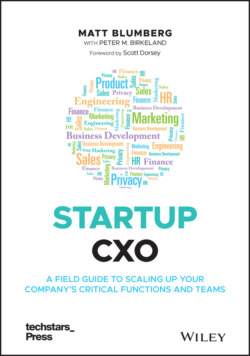Читать книгу Startup CXO - Matt Blumberg - Страница 40
Chapter 19 Board and Shareholder Management
ОглавлениеIt's easy as a startup CFO to focus on the hundreds of internal processes and systems that you'll have to create, and push any Board or shareholder tasks out. After all, your Board might only meet a couple of times a year, so why let that get in the way of doing the real work? Don't fall into that trap! The Board can be a huge strategic advantage for an early‐stage startup and the CFO plays a critical role in Board dynamics. Early on you should work with your CEO to establish processes and checklists for Board meeting materials, records, communication, and sources of truth for shareholder and equity information. The earlier the equity records and processes are moved away from spreadsheets, the better.
For the most part, the startup Board Book is a job for the CEO, but this is an area where the startup CFO can be a good partner. You can help the CEO establish an effective Board Book template and then produce the monthly reports for the Board with enough time for them to review the materials before the meeting. You don't want to provide materials for the first time at the meeting or you'll waste everyone's time.
The Board Book process we have used for a long time roughly looks like the following:
Agenda
Official Business (approval of minutes, option grants, etc.)
Primary Reading section. This would be anything meaty you want the Board to review or read and often includes an “On My Mind” section for the top things the CEO is thinking about.
Standard Reporting. Includes financials, KPIs, etc.
Appendix. Items you want to show the Board but may not want to discuss. Could include things like 409a valuations, product roadmap, etc.
As you scale, typically the meeting itself will evolve past just going through the Board Book and hopefully focus on strategic issues rather than a simple reporting out. And as you scale, the CFO may take ownership of coordinating the Board Book production and distribution. Ideally the Board Book could also go to a wider range of people than just the Board, including senior management. You can refer to Chapter 35 in Startup CEO for a lot more on the Board Book.
Corporate lawyers will often insist on fully executed resolutions and minutes during a due diligence process and they'll want those documents fast. So, start by storing these in a logical way to make your (and your team's) life a lot easier in the future. You also want to work with your outside counsel to agree on the minute taker, the source of truth for the records and resolutions, and cap table management. Generally, I prefer to have a person from the company as the minute taker; that way the company owns that responsibility and you have more control over the process and can make sure the minutes/records are complete and timely. Often, if you have your counsel take minutes, you don't see a copy of them until right before the next Board meeting. I like to take minutes during the meeting and sign them right after.
Another fun thing to do is include some sort of fun quote or comment in the minutes. People often don't read minutes (carefully) but once in a while they do and it is nice to give them a fun surprise. Once we had Shake Shack delivered for our Board lunch that included a couple of trays of shakes. Most of us had one, but our Board member Brad Feld ended up with two. I made sure to note in the minutes that Brad had to lie down on the couch soon after.
Once you scale a bit, you'll probably increase the Board size and change the cadence to quarterly. For quarterly shareholder mailings or calls, you'll need to understand requirements in corporate documents and be able to establish a source of truth for shareholder contacts. I'd also highly recommend a very structured meeting before, after, and during the Board meeting. We use 30‐minute quarterly updates that follow a script, send out quarterly email updates, and have an email system of record established.
Another item to keep in mind as you scale the business and raise money is the concept of information rights. Information rights are rights shareholders received per the shareholders agreement that all shareholders are party to. Typically, there will be some rights the preferred investors receive that the common shareholders do not. This can actually be a helpful clause because as you grow, and employees turn their options into shares, you may want to have the ability to control the distribution of information, such as the cap table and key financials.
